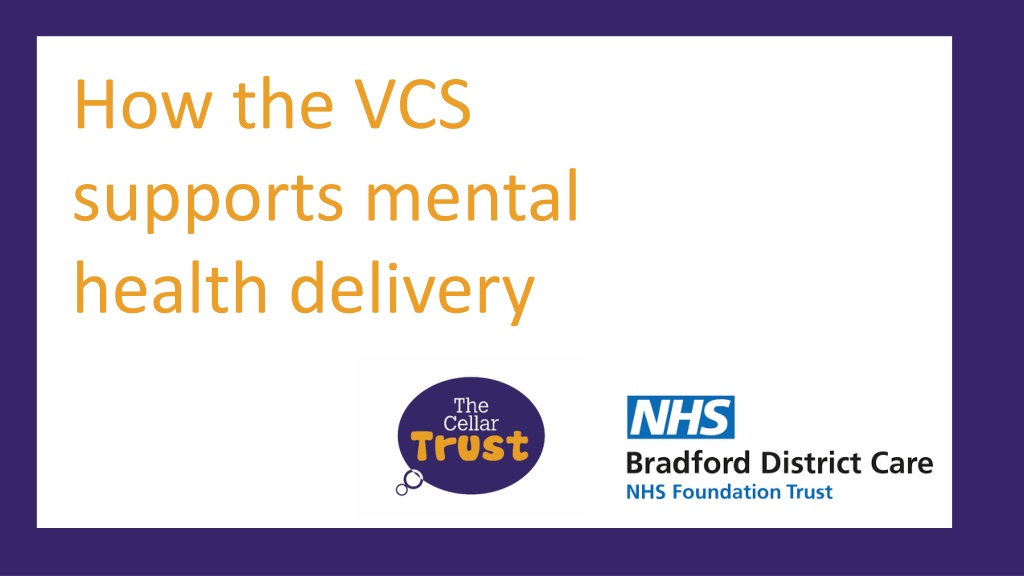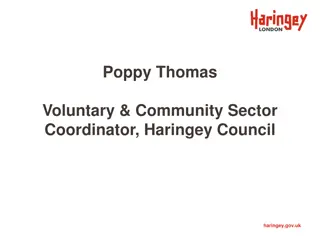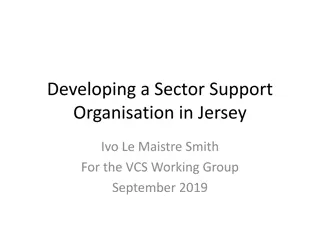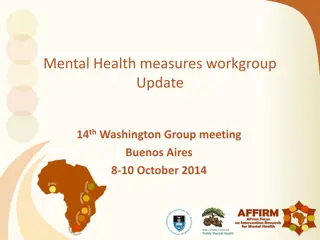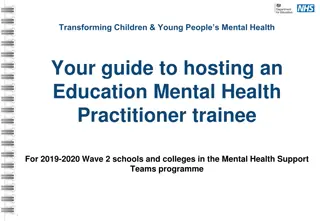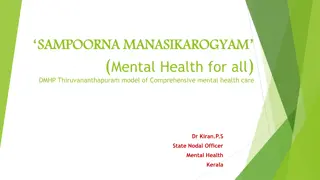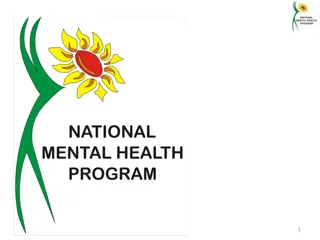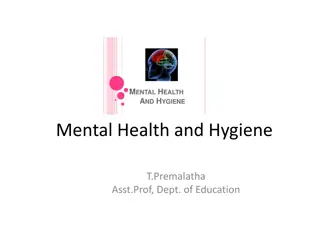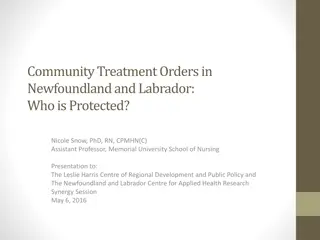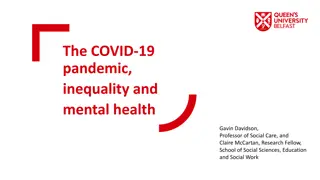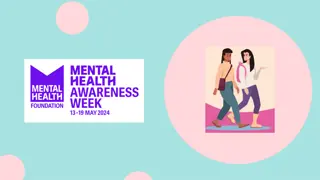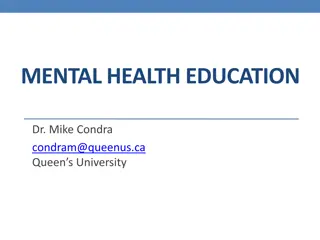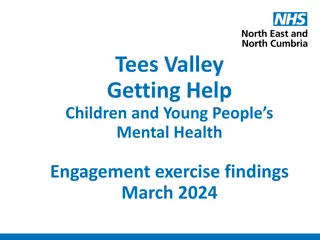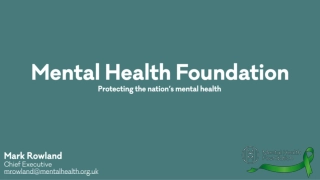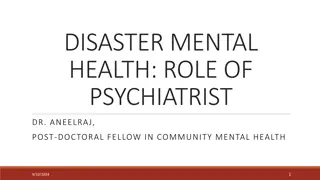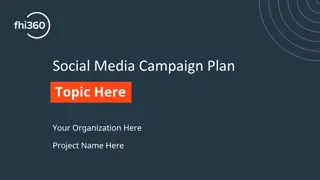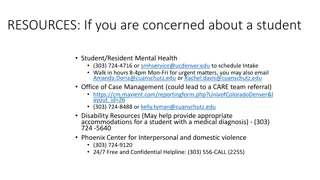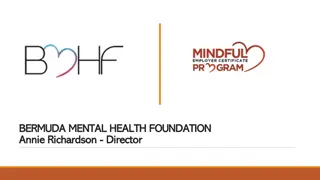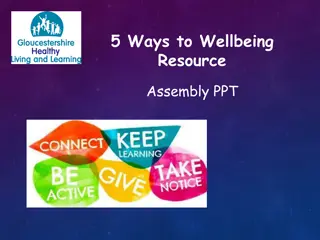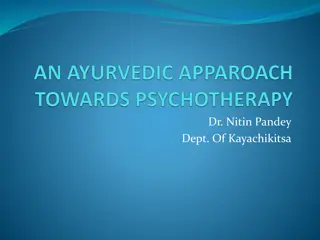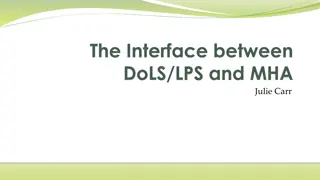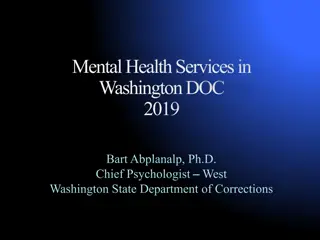Enhancing Mental Health Delivery Through VCS Collaboration
Explore how the Voluntary and Community Sector (VCS) supports mental health delivery, tackling challenges, implementing innovative solutions like peer support, and establishing services such as the Haven for comprehensive care. Collaboration among NHS, local authorities, police, and VCS has significantly improved crisis care pathways, reducing overspending and enhancing service user experiences.
Uploaded on Sep 24, 2024 | 0 Views
Download Presentation

Please find below an Image/Link to download the presentation.
The content on the website is provided AS IS for your information and personal use only. It may not be sold, licensed, or shared on other websites without obtaining consent from the author. Download presentation by click this link. If you encounter any issues during the download, it is possible that the publisher has removed the file from their server.
E N D
Presentation Transcript
How the VCS supports mental health delivery
Introduction Who we are What we will cover today o Some models for how we are working together o Why work with the VCS? o Top tips o Questions Grainne Eloi General Manager for MH Services, Bradford District Care NHS Foundation Trust Kim Shutler CEO, The Cellar Trust and Chair Bradford VCS Assembly
Acute and crisis care pathway
2014: the challenges 1.8 million a year overspend on acute out of area placements Friction between system partners (NHS, local authority and VCS) No crisis service for those not known to services out of hours High use of police cells Poor experience for service users Staff frustrated
What we did Crisis Care Concordat as a lever to bring partners together (NHS, local authority, ambulance, police, VCS and commissioners) Launch of the First Response Service (single point of access) Launch of Sanctuary as Mind in Bradford (night time safe space) Launch of Haven at The Cellar Trust (day time safe space peer support lead provision) Launch of Children and Young People s Safe Space at Creative Support
What we did Peer support in-reaching into A&E (winter pressures) Peer support working with A&E frequent attenders in the community ENRICH national research project in-reaching into the wards, and delivering peer support to reduce readmissions. I was extremely grateful and lucky to have Peter to not only help me with my problems, but could also relate to what I was going through and advise me as best as possible. I struggle to meet people that understand me but felt instantly comfortable with Peter .
Haven: What was special? Haven is a peer support lead, VCS based non-clinical service Jointly governed by VCS, CCG, BDCFT and BMDC Complementary skills and expertise Co-location of Intensive Home Treatment Nurse and Duty Social Worker Assurances and support around clinical governance, risk etc.
The impact Almost 3500 sessions per year delivered by the 3 VCS safe spaces (which otherwise would have been picked up by NHS, police etc) 809 ave cost per self-harm attendance at a general hospital (Lancet Journal) One intervention at Haven (support session) costs an average of 107 per person (total cost 255k per annum) 83% of attendees at Haven who fed back said that they felt more able to deal with a crisis in the future No out of area acute bed placements for 4 years Haven: winner of the Positive Practice in Mental Health Crisis and Acute Care Award 2018
What clients say It was really helpful talking to a professional who actually knows and understands how it feels. For the first time I felt totally understood . I have been waiting since 2002 for help and have experienced difficulties accessing it. I feel very much today that I was listened to effectively and compassionately and am at last feeling hope. Am very grateful indeed . The noise of traffic inside my mind, the voices, they eased off away from me. There, as soon as she came to meet me at the traffic light bench. I was caught in a safety net.
What partners say Much is talked about effective partnership work. It s harder to find impressive examples. The Haven is one such. Built from a passionate shared commitment to get alongside people at moments of personal crisis; concern for hierarchies, formal job titles and institutional budgets are pushed to the background. At the foreground is the desire to do what it takes to build people s personal resilience and independence. Kersten England, CEO, Bradford Council
IAPT: My Wellbeing College
What we did Peer support at the first point of contact (initial IAPT assessments in the Enrolment Team) Staff employed by The Cellar Trust but working into an NHS team dual managed VCS delivering psycho-education courses : Stressbuster and Suicide Awareness (Step 1 interventions) in the community (range of VCS providers) Peer support lead guided telehealth service subcontracted to The Cellar Trust Developing pathways to becoming PWPs
What we did Established a Future in Mind delivery group with statutory and VCS partners New VCS and Youth Service buddy scheme to work with people on the CAMHS waiting list Digital development to allow VCS to auto-upload their outcome data to the NHS Mental Health Data set VCS lead scheme putting mental health champions into schools
Plans Peer support workers will be part of the plans for the Community Mental Health Teams (VCS employed) Future plans to look at how this extends into the inpatient wards to enhance the therapeutic experience
Top tips for collaboration Relationships and trust are vital and these things take time and investment Culture change takes more time than you might expect Each partner brings something different to the table We are different but we share the same vision If at first you don t succeed . Shared ownership and responsibility when things go wrong and celebrating together when things go right!
Top tips from the NHS Know your local NHS service Identify the key people you need to make friends with Introduce yourself Be clear about what you deliver NHS like numbers, and governance, what has your success been, do your metrics evidence improvements? What have your successes been? Explain how you can improve the NHS offer
Top tips from the VCS Do it together (not instead of them) Understand how you fit with their services, the wider system and pressures (talk in their language) Invest in relationships Share the positive data and feedback and celebrate success together Be ready for the snobbery (from the minority) Be brave in putting forward your ideas Use it as an opportunity to identify other areas for collaboration
Why work with the VCS? They can be innovative, agile and responsive Clients don t always want a traditional clinical response It isn t the cheap option but can deliver a better ROI due to lower overheads Helps to address NHS work force challenges: They can bring in other sources of funding and support They are often rooted in communities and can reach different people They can complement statutory provision (not replace) Frees up specialist/clinical staff to do what they are highly qualified to do.
Contact details Kim Shutler, CEO, The Cellar Trust @KimShutler www.thecellartrust.org Kim.shutler@thecellartrust.org Grainne Eloi, General Manager for Mental Health Services, Bradford District Foundation Care Trust Grainne.eloi@bdct.nhs.uk
